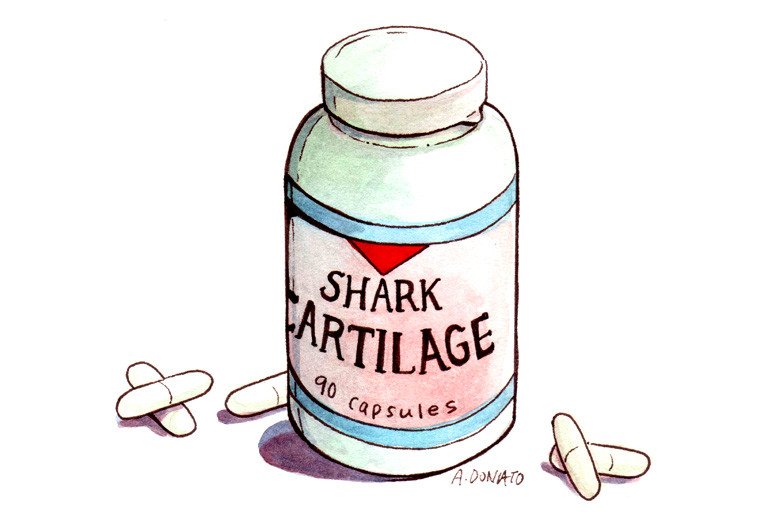
Common Names
- Shark Cartilage
For Patients & Caregivers
Tell your healthcare providers about any dietary supplements you’re taking, such as herbs, vitamins, minerals, and natural or home remedies. This will help them manage your care and keep you safe.
What is it?
Shark cartilage is not effective in treating cancer.
Since cartilage is a body tissue in which no blood vessels are present, researchers guessed that certain molecules isolated from shark cartilage could inhibit the growth of blood vessels. This action, called anti-angiogenesis, was seen when shark cartilage was directly applied to tumors in a test tube. However, when these extracts were given by mouth (how all over-the-counter shark cartilage supplements are taken), no anti-tumor effect occurred in mice or in humans. A purified shark cartilage product called Neovastat (AE-941) can reduce tumor size in animals. However, it did not improve survival in lung cancer patients.
What are the potential uses and benefits?
- To treat and prevent cancer
Studies in animals and humans do not support this use. - To treat Kaposi sarcoma
There is one case report of regression of Kaposi sarcoma in a patient who took low-dose shark cartilage for a prolonged period.
There is no scientific evidence to support the following claims: - To stimulate the immune system
- To reduce inflammation in conditions such as arthritis, osteoarthritis, hemorrhoids, colitis, and psoriasis
- For faster wound healing
- To reduce bone loss in osteoporosis
- To treat degenerative eye conditions such as glaucoma, macular degeneration, and diabetic retinopathy
What are the side effects?
- Gastrointestinal effects have been reported but are rare: Nausea, vomiting, upset stomach, constipation, diarrhea, and loss of appetite.
- Hypoglycemia (low blood sugar) was reported in one patient with type II diabetes.
- Tell your doctor immediately if you develop the following symptoms: fever, jaundice (yellowing of the skin), nausea, vomiting, diarrhea, and/or yellowing of the whites of the eyes. These may indicate serious liver problems.
What else do I need to know?
Special Point:
- Over-the-counter shark cartilage supplements contain varying amounts of shark cartilage. Some are composed mainly of fillers and may not have any biological activity. Furthermore, it is debated whether the large proteins responsible for shark cartilage's activity are absorbed through the gastrointestinal tract, or whether they are simply digested and rendered useless.
- The Federal Trade Commission has barred manufacturers from making unsupported health claims for their shark cartilage products.
For Healthcare Professionals
Brand Name
Clinical Summary
Obtained from the spiny dogfish shark and hammerhead shark (1), shark cartilage is promoted as a dietary supplement to treat cancer (2) (3) (4) (5), arthritis, osteoporosis, Kaposi sarcoma (6), macular degeneration, psoriasis (7), and inflammatory disorders. Shark cartilage extracts showed antiangiogenic and antitumor activities in vitro (8) (9) and in animal models (10) (11) (12) (13), but clinical use remains controversial due to lack of bioavailability data and unsatisfactory patient outcomes in clinical trials (1) (14).
Shark cartilage has also been studied for Kaposi sarcoma (6), metastatic renal cell carcinoma (5), and multiple myeloma (4) in early phase clinical trials. Neovastat (AE-941), a purified shark cartilage extract, did not improve survival in patients with non-small cell lung cancer (15), but is effective against psoriasis (7).
Most trials report low toxicity, but regular consumption of a shark cartilage supplement was associated with reversible hepatic dysfunction in a 57-year-old man (16). The Federal Trade Commission has barred manufacturers from making unsubstantiated claims of efficacy for their shark cartilage products (25). Shark cartilage should not be confused with bovine cartilage.
Purported Uses and Benefits
- Arthritis
- Cancer prevention
- Cancer treatment
- Colitis
- Diabetic retinopathy
- Glaucoma
- Hemorrhoids
- Immunostimulation
- Inflammation
- Kaposi sarcoma
- Macular degeneration
- Osteoarthritis
- Osteoporosis
- Psoriasis
- Wound healing
Mechanism of Action
The glycoproteins sphyrnastatin 1 and 2 and other unidentified factors (1) are thought responsible for the activity of shark cartilage (SC), which shows strong antiangiogenic activity and inhibition of tumor neovascularization in numerous in vitro and animal studies (17). Theories for its mechanism include interference with endothelial cell migration and adhesion via modification of adhesion protein organization and inhibition of collagenase (18).
A murine glioma model suggests that induction of t-PA plays an essential role (19). Intraperitoneal administration suppresses sarcoma-180 growth and B16-F10 melanoma metastasis in mice (9) (11), but oral bioavailability is questionable based on the results of mouse models (20). The manufacturers of Neovastat (AE-941), a shark cartilage extract, report that this formulation inhibits embryonic vascularization (21), endothelial cell proliferation (22), tubulogenesis, VEGF binding to endothelial cells, VEGF-dependent tyrosine phosphorylation of the VEGF receptor, and the VEGF-dependent increase in vascular permeability in vitro. They also claim that it inhibits serine elastase and matrix metalloproteinase activity (23). Oral administration of Neovastat has produced anti-tumor effects in mouse models (10).
A diet containing the acidic ethanol-precipitate-fraction of a water extract of shark cartilage significantly increased serum inhibitory activity against matrix metalloproteinase (MMP)-9 and reduced the number of adenocarcinomas in the pancreatic duct in a hamster model (24).
Warnings
- Commercially available supplements contain varying amounts of shark cartilage. Some are composed primarily of fillers and may not have any biological activity.
- Neovastat (AE-941) is a highly purified extract of shark cartilage. It is an investigational new drug and is not available to the general public. Other shark cartilage products may not have similar properties.
Adverse Reactions
Infrequent: Nausea, vomiting, dyspepsia, constipation, diarrhea, anorexia, hypoglycemia in a type II diabetic patient (5).
Case Report: A 57-year-old man experienced nausea, vomiting, diarrhea, anorexia, jaundice, low-grade fever, scleral icterus, and elevated liver function tests after consuming a shark cartilage supplement for 10 weeks. Normal liver function resumed after discontinuation of the supplement (16).